Understanding Contemporary Tourism: Development and its Impacts.
VerifiedAdded on 2023/06/17
|10
|2292
|86
Report
AI Summary
This report provides an overview of contemporary tourism, outlining its development and analyzing its economic, environmental, and socio-cultural impacts. It discusses the positive economic impacts such as foreign currency revenue and employment creation, as well as negative impacts like infrastructure costs and price increases. The report also explores the environmental benefits of tourism, including increased awareness and ecosystem preservation, alongside negative impacts like natural resource depletion and pollution. Furthermore, it examines socio-cultural impacts, highlighting the commercialization of culture and community strengthening, while also addressing social change and the degradation of historical and cultural values. The report concludes that tourism has multifaceted effects, emphasizing the need for sustainable practices to maximize benefits and minimize adverse consequences. Desklib offers a platform for students to access this and other solved assignments.
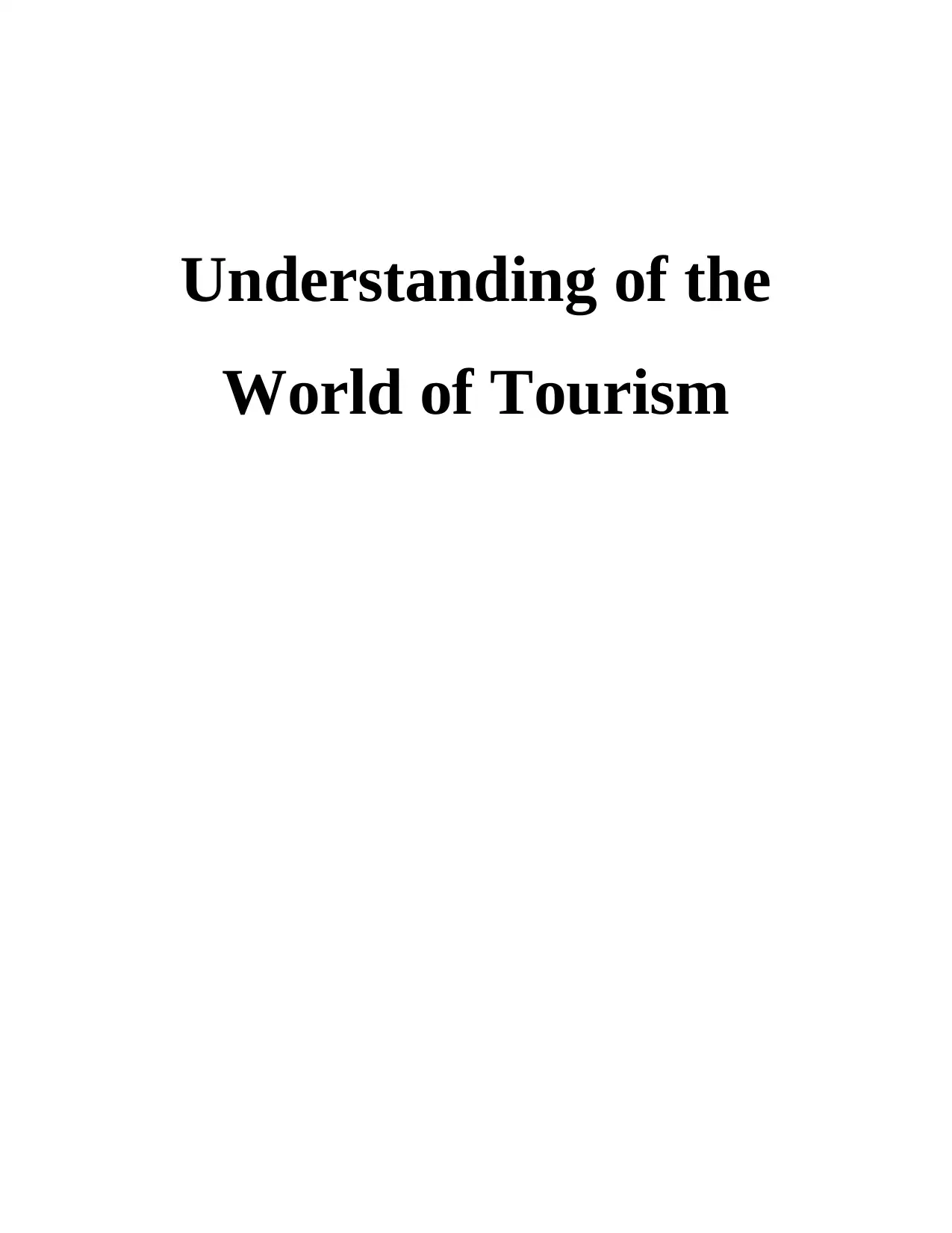
Understanding of the
World of Tourism
World of Tourism
Paraphrase This Document
Need a fresh take? Get an instant paraphrase of this document with our AI Paraphraser

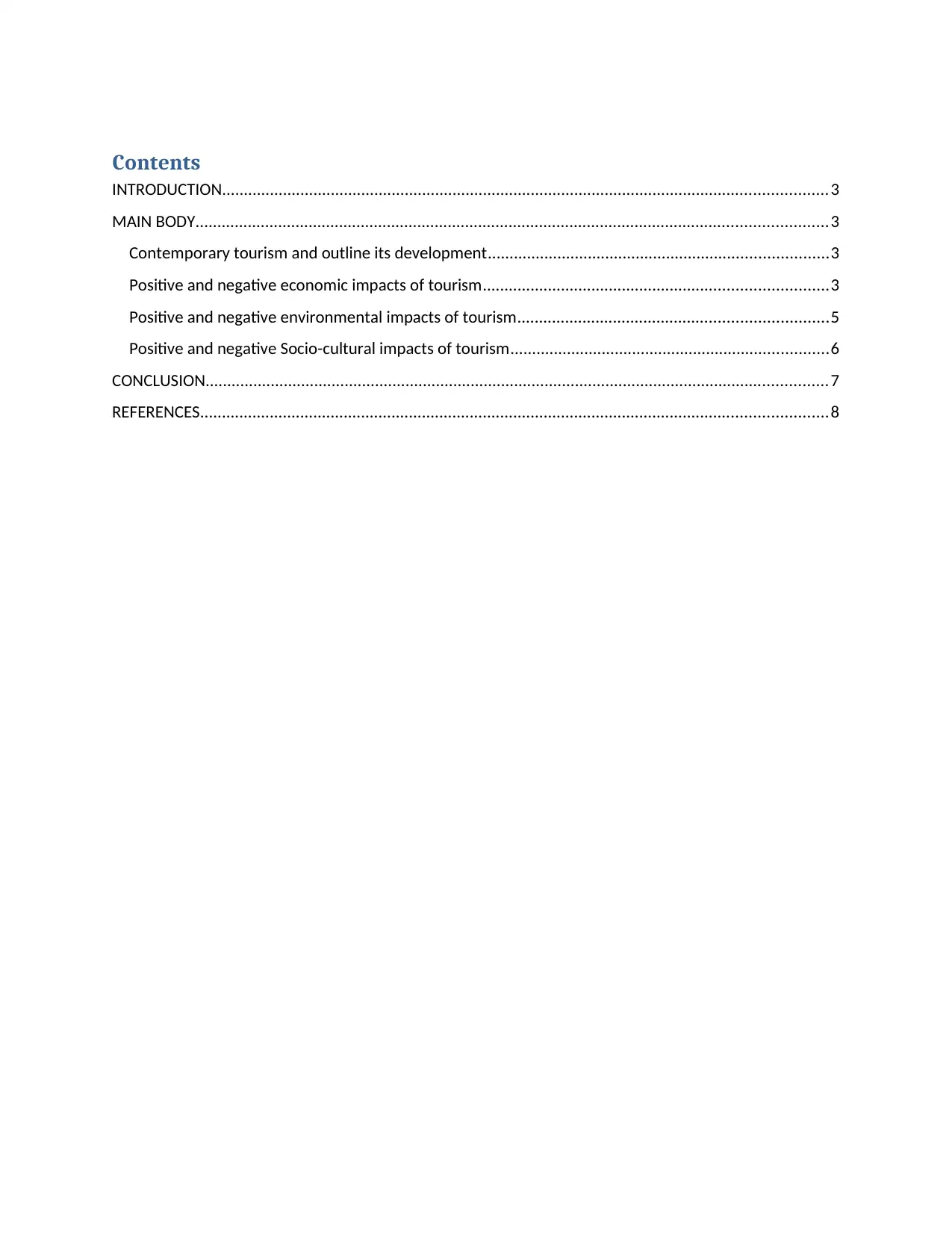
Contents
INTRODUCTION...........................................................................................................................................3
MAIN BODY.................................................................................................................................................3
Contemporary tourism and outline its development..............................................................................3
Positive and negative economic impacts of tourism...............................................................................3
Positive and negative environmental impacts of tourism.......................................................................5
Positive and negative Socio-cultural impacts of tourism.........................................................................6
CONCLUSION...............................................................................................................................................7
REFERENCES................................................................................................................................................8
INTRODUCTION...........................................................................................................................................3
MAIN BODY.................................................................................................................................................3
Contemporary tourism and outline its development..............................................................................3
Positive and negative economic impacts of tourism...............................................................................3
Positive and negative environmental impacts of tourism.......................................................................5
Positive and negative Socio-cultural impacts of tourism.........................................................................6
CONCLUSION...............................................................................................................................................7
REFERENCES................................................................................................................................................8
⊘ This is a preview!⊘
Do you want full access?
Subscribe today to unlock all pages.

Trusted by 1+ million students worldwide
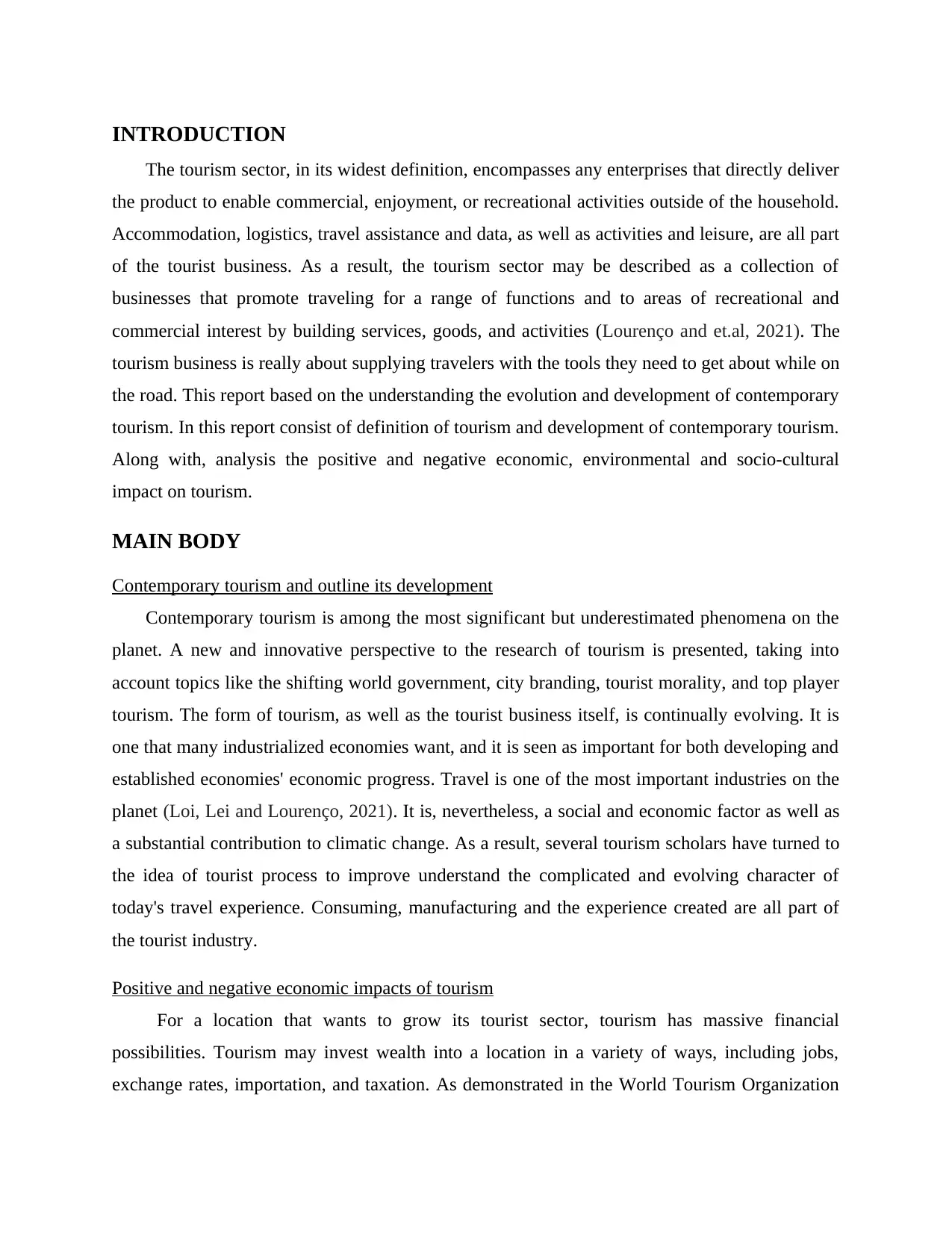
INTRODUCTION
The tourism sector, in its widest definition, encompasses any enterprises that directly deliver
the product to enable commercial, enjoyment, or recreational activities outside of the household.
Accommodation, logistics, travel assistance and data, as well as activities and leisure, are all part
of the tourist business. As a result, the tourism sector may be described as a collection of
businesses that promote traveling for a range of functions and to areas of recreational and
commercial interest by building services, goods, and activities (Lourenço and et.al, 2021). The
tourism business is really about supplying travelers with the tools they need to get about while on
the road. This report based on the understanding the evolution and development of contemporary
tourism. In this report consist of definition of tourism and development of contemporary tourism.
Along with, analysis the positive and negative economic, environmental and socio-cultural
impact on tourism.
MAIN BODY
Contemporary tourism and outline its development
Contemporary tourism is among the most significant but underestimated phenomena on the
planet. A new and innovative perspective to the research of tourism is presented, taking into
account topics like the shifting world government, city branding, tourist morality, and top player
tourism. The form of tourism, as well as the tourist business itself, is continually evolving. It is
one that many industrialized economies want, and it is seen as important for both developing and
established economies' economic progress. Travel is one of the most important industries on the
planet (Loi, Lei and Lourenço, 2021). It is, nevertheless, a social and economic factor as well as
a substantial contribution to climatic change. As a result, several tourism scholars have turned to
the idea of tourist process to improve understand the complicated and evolving character of
today's travel experience. Consuming, manufacturing and the experience created are all part of
the tourist industry.
Positive and negative economic impacts of tourism
For a location that wants to grow its tourist sector, tourism has massive financial
possibilities. Tourism may invest wealth into a location in a variety of ways, including jobs,
exchange rates, importation, and taxation. As demonstrated in the World Tourism Organization
The tourism sector, in its widest definition, encompasses any enterprises that directly deliver
the product to enable commercial, enjoyment, or recreational activities outside of the household.
Accommodation, logistics, travel assistance and data, as well as activities and leisure, are all part
of the tourist business. As a result, the tourism sector may be described as a collection of
businesses that promote traveling for a range of functions and to areas of recreational and
commercial interest by building services, goods, and activities (Lourenço and et.al, 2021). The
tourism business is really about supplying travelers with the tools they need to get about while on
the road. This report based on the understanding the evolution and development of contemporary
tourism. In this report consist of definition of tourism and development of contemporary tourism.
Along with, analysis the positive and negative economic, environmental and socio-cultural
impact on tourism.
MAIN BODY
Contemporary tourism and outline its development
Contemporary tourism is among the most significant but underestimated phenomena on the
planet. A new and innovative perspective to the research of tourism is presented, taking into
account topics like the shifting world government, city branding, tourist morality, and top player
tourism. The form of tourism, as well as the tourist business itself, is continually evolving. It is
one that many industrialized economies want, and it is seen as important for both developing and
established economies' economic progress. Travel is one of the most important industries on the
planet (Loi, Lei and Lourenço, 2021). It is, nevertheless, a social and economic factor as well as
a substantial contribution to climatic change. As a result, several tourism scholars have turned to
the idea of tourist process to improve understand the complicated and evolving character of
today's travel experience. Consuming, manufacturing and the experience created are all part of
the tourist industry.
Positive and negative economic impacts of tourism
For a location that wants to grow its tourist sector, tourism has massive financial
possibilities. Tourism may invest wealth into a location in a variety of ways, including jobs,
exchange rates, importation, and taxation. As demonstrated in the World Tourism Organization
Paraphrase This Document
Need a fresh take? Get an instant paraphrase of this document with our AI Paraphraser
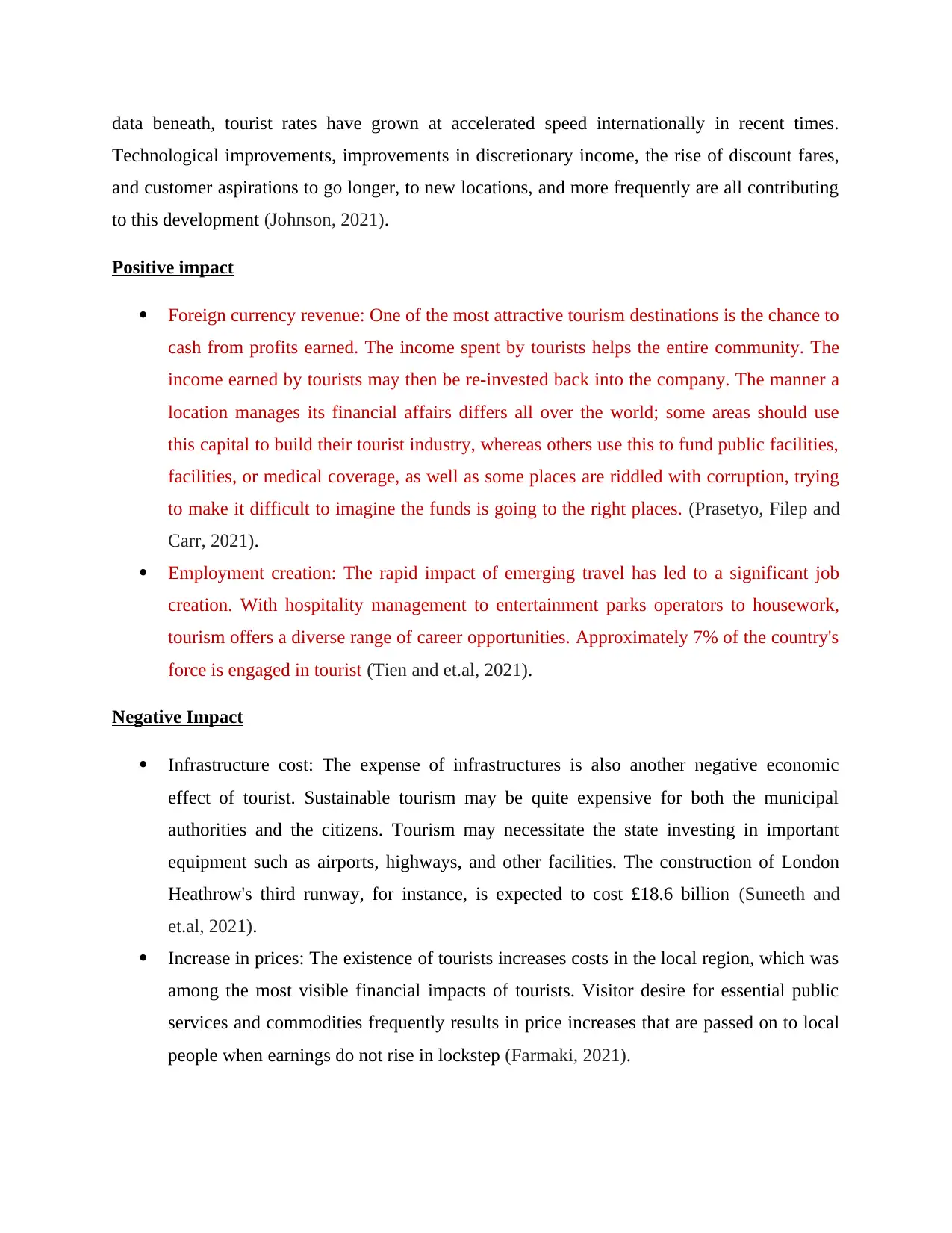
data beneath, tourist rates have grown at accelerated speed internationally in recent times.
Technological improvements, improvements in discretionary income, the rise of discount fares,
and customer aspirations to go longer, to new locations, and more frequently are all contributing
to this development (Johnson, 2021).
Positive impact
Foreign currency revenue: One of the most attractive tourism destinations is the chance to
cash from profits earned. The income spent by tourists helps the entire community. The
income earned by tourists may then be re-invested back into the company. The manner a
location manages its financial affairs differs all over the world; some areas should use
this capital to build their tourist industry, whereas others use this to fund public facilities,
facilities, or medical coverage, as well as some places are riddled with corruption, trying
to make it difficult to imagine the funds is going to the right places. (Prasetyo, Filep and
Carr, 2021).
Employment creation: The rapid impact of emerging travel has led to a significant job
creation. With hospitality management to entertainment parks operators to housework,
tourism offers a diverse range of career opportunities. Approximately 7% of the country's
force is engaged in tourist (Tien and et.al, 2021).
Negative Impact
Infrastructure cost: The expense of infrastructures is also another negative economic
effect of tourist. Sustainable tourism may be quite expensive for both the municipal
authorities and the citizens. Tourism may necessitate the state investing in important
equipment such as airports, highways, and other facilities. The construction of London
Heathrow's third runway, for instance, is expected to cost £18.6 billion (Suneeth and
et.al, 2021).
Increase in prices: The existence of tourists increases costs in the local region, which was
among the most visible financial impacts of tourists. Visitor desire for essential public
services and commodities frequently results in price increases that are passed on to local
people when earnings do not rise in lockstep (Farmaki, 2021).
Technological improvements, improvements in discretionary income, the rise of discount fares,
and customer aspirations to go longer, to new locations, and more frequently are all contributing
to this development (Johnson, 2021).
Positive impact
Foreign currency revenue: One of the most attractive tourism destinations is the chance to
cash from profits earned. The income spent by tourists helps the entire community. The
income earned by tourists may then be re-invested back into the company. The manner a
location manages its financial affairs differs all over the world; some areas should use
this capital to build their tourist industry, whereas others use this to fund public facilities,
facilities, or medical coverage, as well as some places are riddled with corruption, trying
to make it difficult to imagine the funds is going to the right places. (Prasetyo, Filep and
Carr, 2021).
Employment creation: The rapid impact of emerging travel has led to a significant job
creation. With hospitality management to entertainment parks operators to housework,
tourism offers a diverse range of career opportunities. Approximately 7% of the country's
force is engaged in tourist (Tien and et.al, 2021).
Negative Impact
Infrastructure cost: The expense of infrastructures is also another negative economic
effect of tourist. Sustainable tourism may be quite expensive for both the municipal
authorities and the citizens. Tourism may necessitate the state investing in important
equipment such as airports, highways, and other facilities. The construction of London
Heathrow's third runway, for instance, is expected to cost £18.6 billion (Suneeth and
et.al, 2021).
Increase in prices: The existence of tourists increases costs in the local region, which was
among the most visible financial impacts of tourists. Visitor desire for essential public
services and commodities frequently results in price increases that are passed on to local
people when earnings do not rise in lockstep (Farmaki, 2021).
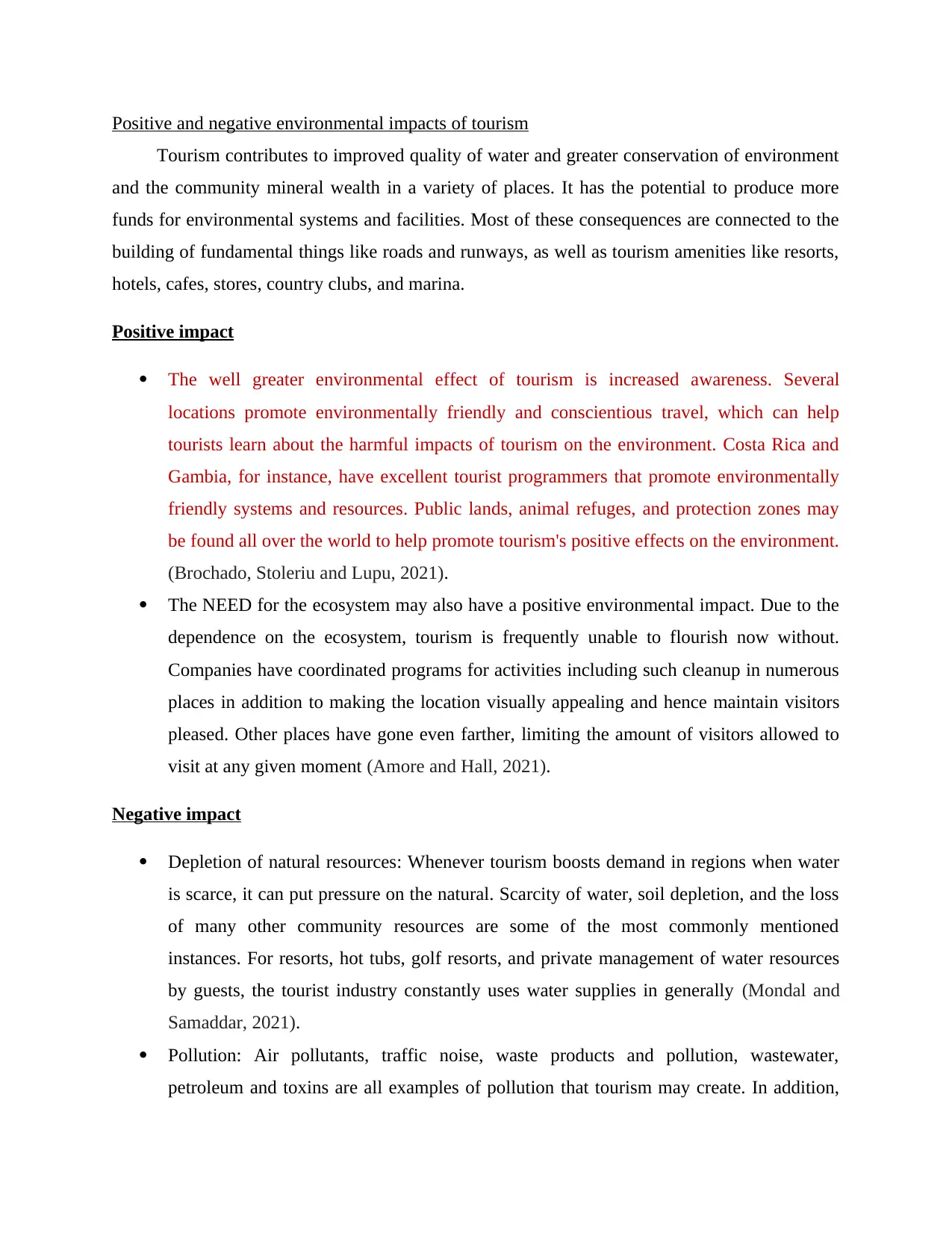
Positive and negative environmental impacts of tourism
Tourism contributes to improved quality of water and greater conservation of environment
and the community mineral wealth in a variety of places. It has the potential to produce more
funds for environmental systems and facilities. Most of these consequences are connected to the
building of fundamental things like roads and runways, as well as tourism amenities like resorts,
hotels, cafes, stores, country clubs, and marina.
Positive impact
The well greater environmental effect of tourism is increased awareness. Several
locations promote environmentally friendly and conscientious travel, which can help
tourists learn about the harmful impacts of tourism on the environment. Costa Rica and
Gambia, for instance, have excellent tourist programmers that promote environmentally
friendly systems and resources. Public lands, animal refuges, and protection zones may
be found all over the world to help promote tourism's positive effects on the environment.
(Brochado, Stoleriu and Lupu, 2021).
The NEED for the ecosystem may also have a positive environmental impact. Due to the
dependence on the ecosystem, tourism is frequently unable to flourish now without.
Companies have coordinated programs for activities including such cleanup in numerous
places in addition to making the location visually appealing and hence maintain visitors
pleased. Other places have gone even farther, limiting the amount of visitors allowed to
visit at any given moment (Amore and Hall, 2021).
Negative impact
Depletion of natural resources: Whenever tourism boosts demand in regions when water
is scarce, it can put pressure on the natural. Scarcity of water, soil depletion, and the loss
of many other community resources are some of the most commonly mentioned
instances. For resorts, hot tubs, golf resorts, and private management of water resources
by guests, the tourist industry constantly uses water supplies in generally (Mondal and
Samaddar, 2021).
Pollution: Air pollutants, traffic noise, waste products and pollution, wastewater,
petroleum and toxins are all examples of pollution that tourism may create. In addition,
Tourism contributes to improved quality of water and greater conservation of environment
and the community mineral wealth in a variety of places. It has the potential to produce more
funds for environmental systems and facilities. Most of these consequences are connected to the
building of fundamental things like roads and runways, as well as tourism amenities like resorts,
hotels, cafes, stores, country clubs, and marina.
Positive impact
The well greater environmental effect of tourism is increased awareness. Several
locations promote environmentally friendly and conscientious travel, which can help
tourists learn about the harmful impacts of tourism on the environment. Costa Rica and
Gambia, for instance, have excellent tourist programmers that promote environmentally
friendly systems and resources. Public lands, animal refuges, and protection zones may
be found all over the world to help promote tourism's positive effects on the environment.
(Brochado, Stoleriu and Lupu, 2021).
The NEED for the ecosystem may also have a positive environmental impact. Due to the
dependence on the ecosystem, tourism is frequently unable to flourish now without.
Companies have coordinated programs for activities including such cleanup in numerous
places in addition to making the location visually appealing and hence maintain visitors
pleased. Other places have gone even farther, limiting the amount of visitors allowed to
visit at any given moment (Amore and Hall, 2021).
Negative impact
Depletion of natural resources: Whenever tourism boosts demand in regions when water
is scarce, it can put pressure on the natural. Scarcity of water, soil depletion, and the loss
of many other community resources are some of the most commonly mentioned
instances. For resorts, hot tubs, golf resorts, and private management of water resources
by guests, the tourist industry constantly uses water supplies in generally (Mondal and
Samaddar, 2021).
Pollution: Air pollutants, traffic noise, waste products and pollution, wastewater,
petroleum and toxins are all examples of pollution that tourism may create. In addition,
⊘ This is a preview!⊘
Do you want full access?
Subscribe today to unlock all pages.

Trusted by 1+ million students worldwide
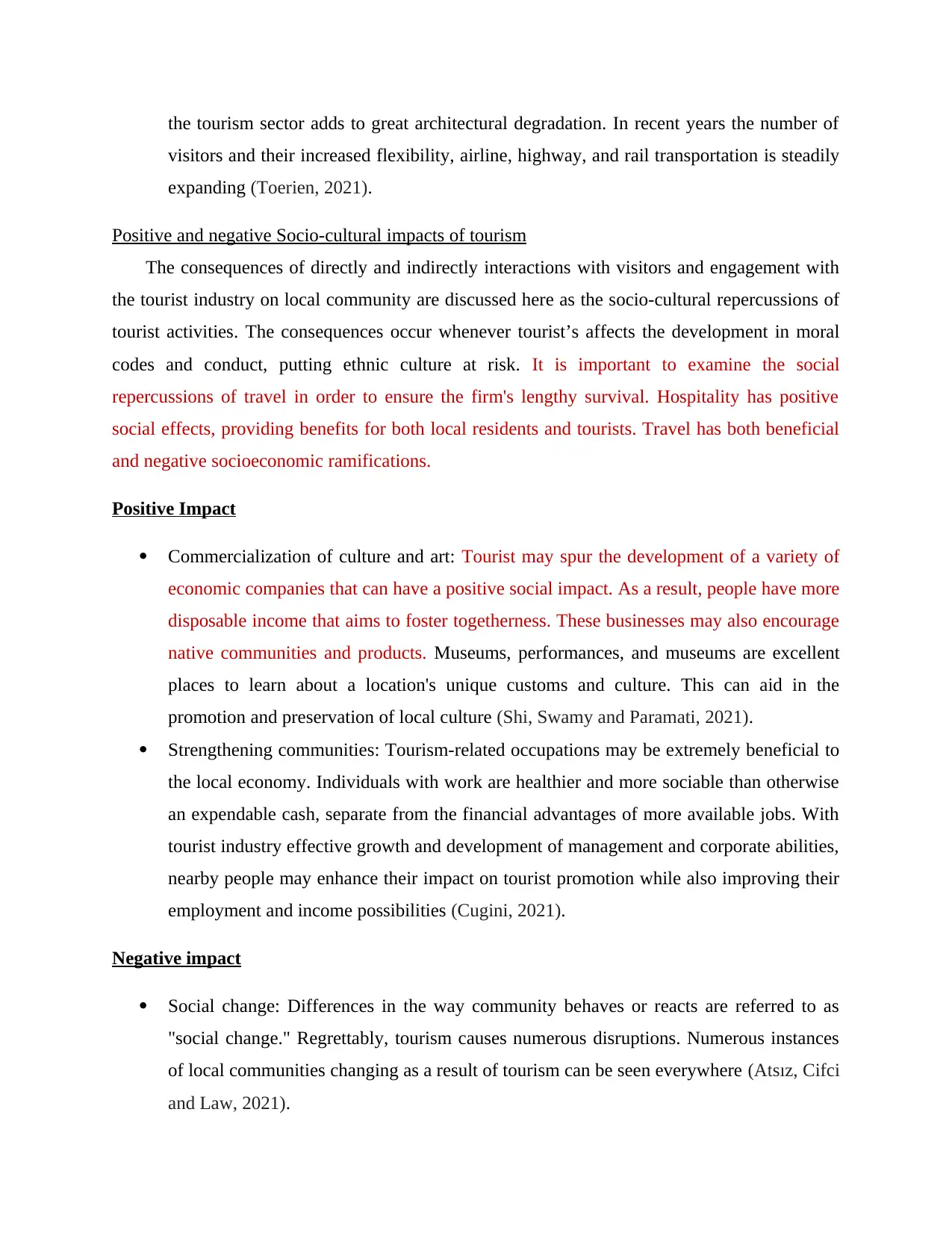
the tourism sector adds to great architectural degradation. In recent years the number of
visitors and their increased flexibility, airline, highway, and rail transportation is steadily
expanding (Toerien, 2021).
Positive and negative Socio-cultural impacts of tourism
The consequences of directly and indirectly interactions with visitors and engagement with
the tourist industry on local community are discussed here as the socio-cultural repercussions of
tourist activities. The consequences occur whenever tourist’s affects the development in moral
codes and conduct, putting ethnic culture at risk. It is important to examine the social
repercussions of travel in order to ensure the firm's lengthy survival. Hospitality has positive
social effects, providing benefits for both local residents and tourists. Travel has both beneficial
and negative socioeconomic ramifications.
Positive Impact
Commercialization of culture and art: Tourist may spur the development of a variety of
economic companies that can have a positive social impact. As a result, people have more
disposable income that aims to foster togetherness. These businesses may also encourage
native communities and products. Museums, performances, and museums are excellent
places to learn about a location's unique customs and culture. This can aid in the
promotion and preservation of local culture (Shi, Swamy and Paramati, 2021).
Strengthening communities: Tourism-related occupations may be extremely beneficial to
the local economy. Individuals with work are healthier and more sociable than otherwise
an expendable cash, separate from the financial advantages of more available jobs. With
tourist industry effective growth and development of management and corporate abilities,
nearby people may enhance their impact on tourist promotion while also improving their
employment and income possibilities (Cugini, 2021).
Negative impact
Social change: Differences in the way community behaves or reacts are referred to as
"social change." Regrettably, tourism causes numerous disruptions. Numerous instances
of local communities changing as a result of tourism can be seen everywhere (Atsız, Cifci
and Law, 2021).
visitors and their increased flexibility, airline, highway, and rail transportation is steadily
expanding (Toerien, 2021).
Positive and negative Socio-cultural impacts of tourism
The consequences of directly and indirectly interactions with visitors and engagement with
the tourist industry on local community are discussed here as the socio-cultural repercussions of
tourist activities. The consequences occur whenever tourist’s affects the development in moral
codes and conduct, putting ethnic culture at risk. It is important to examine the social
repercussions of travel in order to ensure the firm's lengthy survival. Hospitality has positive
social effects, providing benefits for both local residents and tourists. Travel has both beneficial
and negative socioeconomic ramifications.
Positive Impact
Commercialization of culture and art: Tourist may spur the development of a variety of
economic companies that can have a positive social impact. As a result, people have more
disposable income that aims to foster togetherness. These businesses may also encourage
native communities and products. Museums, performances, and museums are excellent
places to learn about a location's unique customs and culture. This can aid in the
promotion and preservation of local culture (Shi, Swamy and Paramati, 2021).
Strengthening communities: Tourism-related occupations may be extremely beneficial to
the local economy. Individuals with work are healthier and more sociable than otherwise
an expendable cash, separate from the financial advantages of more available jobs. With
tourist industry effective growth and development of management and corporate abilities,
nearby people may enhance their impact on tourist promotion while also improving their
employment and income possibilities (Cugini, 2021).
Negative impact
Social change: Differences in the way community behaves or reacts are referred to as
"social change." Regrettably, tourism causes numerous disruptions. Numerous instances
of local communities changing as a result of tourism can be seen everywhere (Atsız, Cifci
and Law, 2021).
Paraphrase This Document
Need a fresh take? Get an instant paraphrase of this document with our AI Paraphraser
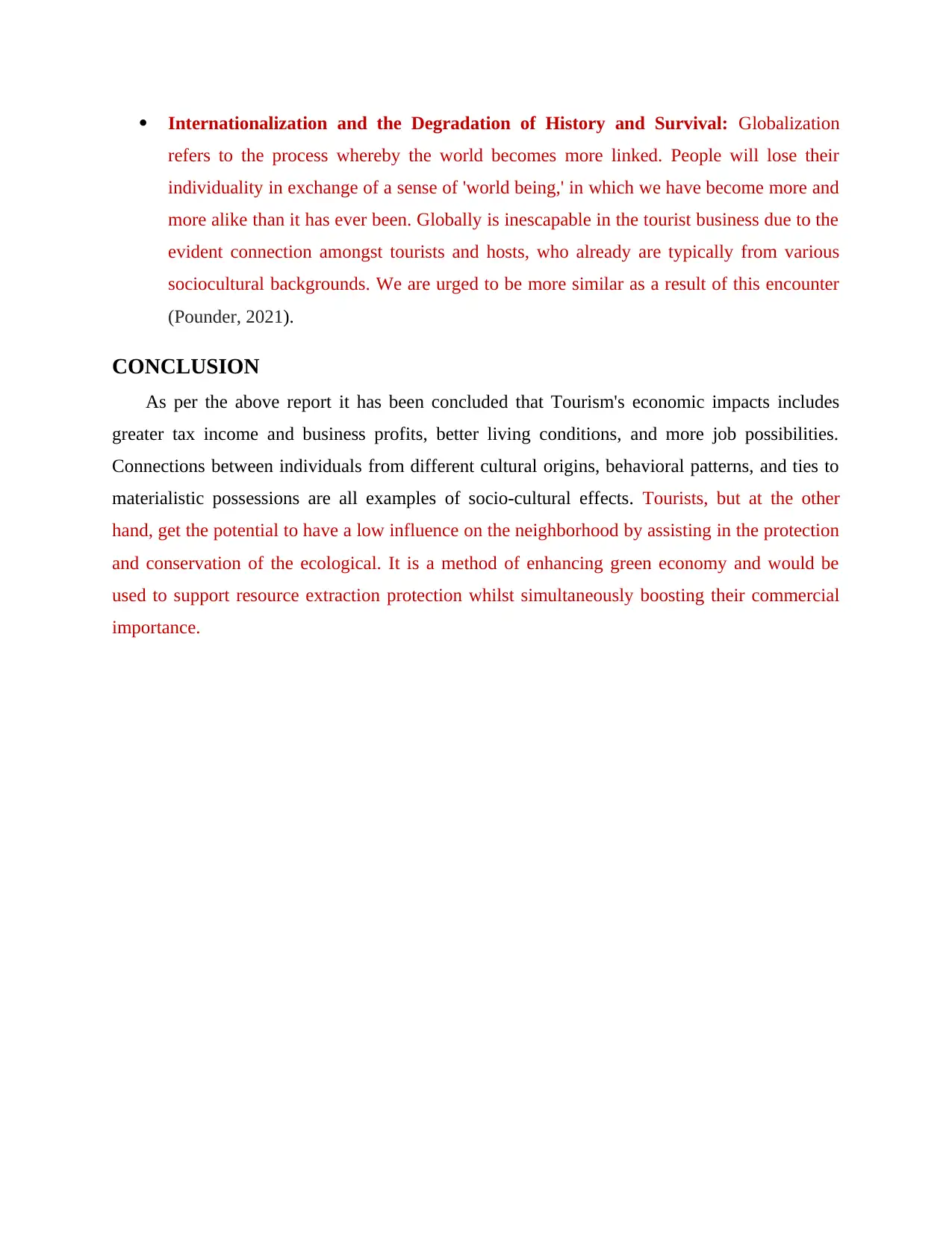
Internationalization and the Degradation of History and Survival: Globalization
refers to the process whereby the world becomes more linked. People will lose their
individuality in exchange of a sense of 'world being,' in which we have become more and
more alike than it has ever been. Globally is inescapable in the tourist business due to the
evident connection amongst tourists and hosts, who already are typically from various
sociocultural backgrounds. We are urged to be more similar as a result of this encounter
(Pounder, 2021).
CONCLUSION
As per the above report it has been concluded that Tourism's economic impacts includes
greater tax income and business profits, better living conditions, and more job possibilities.
Connections between individuals from different cultural origins, behavioral patterns, and ties to
materialistic possessions are all examples of socio-cultural effects. Tourists, but at the other
hand, get the potential to have a low influence on the neighborhood by assisting in the protection
and conservation of the ecological. It is a method of enhancing green economy and would be
used to support resource extraction protection whilst simultaneously boosting their commercial
importance.
refers to the process whereby the world becomes more linked. People will lose their
individuality in exchange of a sense of 'world being,' in which we have become more and
more alike than it has ever been. Globally is inescapable in the tourist business due to the
evident connection amongst tourists and hosts, who already are typically from various
sociocultural backgrounds. We are urged to be more similar as a result of this encounter
(Pounder, 2021).
CONCLUSION
As per the above report it has been concluded that Tourism's economic impacts includes
greater tax income and business profits, better living conditions, and more job possibilities.
Connections between individuals from different cultural origins, behavioral patterns, and ties to
materialistic possessions are all examples of socio-cultural effects. Tourists, but at the other
hand, get the potential to have a low influence on the neighborhood by assisting in the protection
and conservation of the ecological. It is a method of enhancing green economy and would be
used to support resource extraction protection whilst simultaneously boosting their commercial
importance.
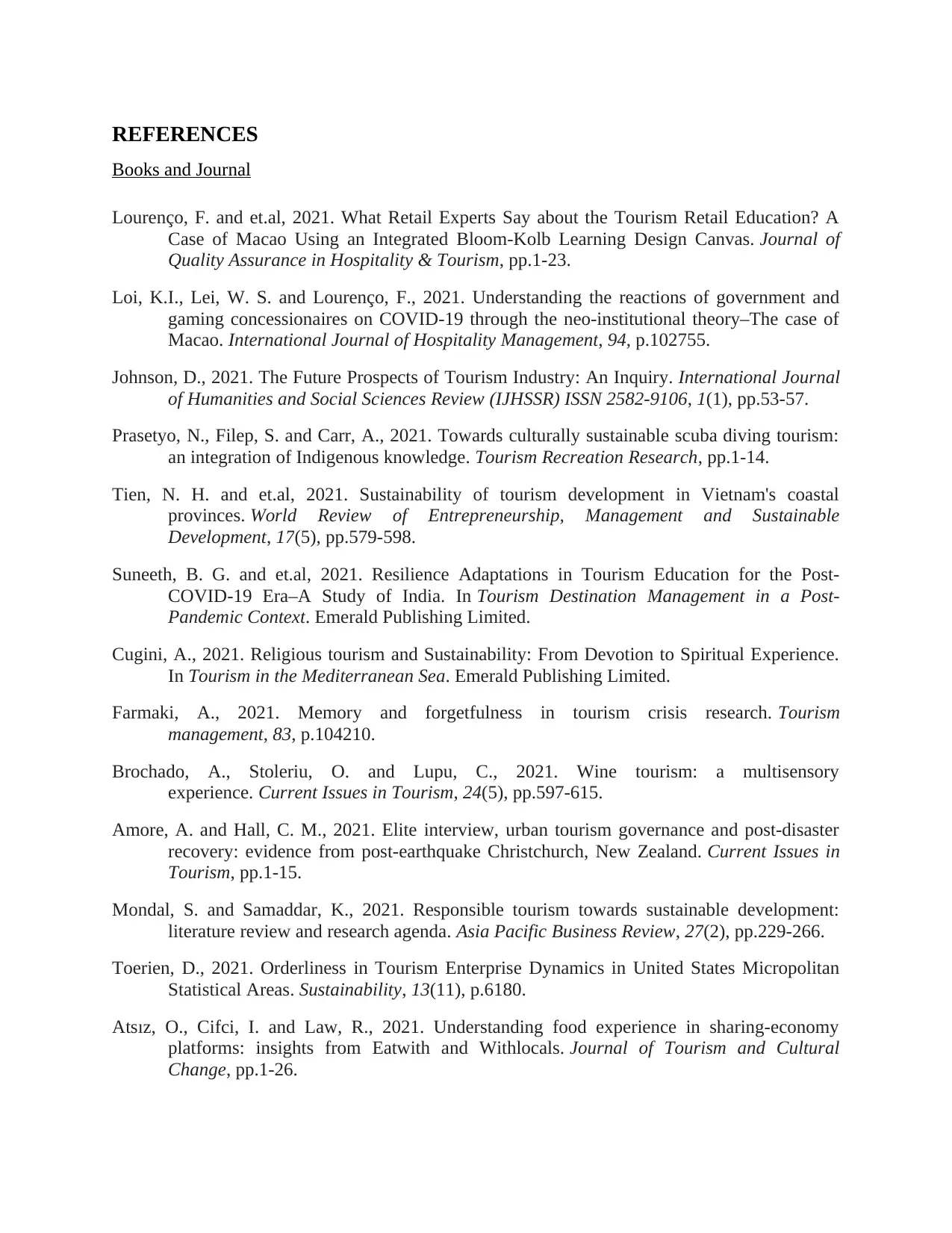
REFERENCES
Books and Journal
Lourenço, F. and et.al, 2021. What Retail Experts Say about the Tourism Retail Education? A
Case of Macao Using an Integrated Bloom-Kolb Learning Design Canvas. Journal of
Quality Assurance in Hospitality & Tourism, pp.1-23.
Loi, K.I., Lei, W. S. and Lourenço, F., 2021. Understanding the reactions of government and
gaming concessionaires on COVID-19 through the neo-institutional theory–The case of
Macao. International Journal of Hospitality Management, 94, p.102755.
Johnson, D., 2021. The Future Prospects of Tourism Industry: An Inquiry. International Journal
of Humanities and Social Sciences Review (IJHSSR) ISSN 2582-9106, 1(1), pp.53-57.
Prasetyo, N., Filep, S. and Carr, A., 2021. Towards culturally sustainable scuba diving tourism:
an integration of Indigenous knowledge. Tourism Recreation Research, pp.1-14.
Tien, N. H. and et.al, 2021. Sustainability of tourism development in Vietnam's coastal
provinces. World Review of Entrepreneurship, Management and Sustainable
Development, 17(5), pp.579-598.
Suneeth, B. G. and et.al, 2021. Resilience Adaptations in Tourism Education for the Post-
COVID-19 Era–A Study of India. In Tourism Destination Management in a Post-
Pandemic Context. Emerald Publishing Limited.
Cugini, A., 2021. Religious tourism and Sustainability: From Devotion to Spiritual Experience.
In Tourism in the Mediterranean Sea. Emerald Publishing Limited.
Farmaki, A., 2021. Memory and forgetfulness in tourism crisis research. Tourism
management, 83, p.104210.
Brochado, A., Stoleriu, O. and Lupu, C., 2021. Wine tourism: a multisensory
experience. Current Issues in Tourism, 24(5), pp.597-615.
Amore, A. and Hall, C. M., 2021. Elite interview, urban tourism governance and post-disaster
recovery: evidence from post-earthquake Christchurch, New Zealand. Current Issues in
Tourism, pp.1-15.
Mondal, S. and Samaddar, K., 2021. Responsible tourism towards sustainable development:
literature review and research agenda. Asia Pacific Business Review, 27(2), pp.229-266.
Toerien, D., 2021. Orderliness in Tourism Enterprise Dynamics in United States Micropolitan
Statistical Areas. Sustainability, 13(11), p.6180.
Atsız, O., Cifci, I. and Law, R., 2021. Understanding food experience in sharing-economy
platforms: insights from Eatwith and Withlocals. Journal of Tourism and Cultural
Change, pp.1-26.
Books and Journal
Lourenço, F. and et.al, 2021. What Retail Experts Say about the Tourism Retail Education? A
Case of Macao Using an Integrated Bloom-Kolb Learning Design Canvas. Journal of
Quality Assurance in Hospitality & Tourism, pp.1-23.
Loi, K.I., Lei, W. S. and Lourenço, F., 2021. Understanding the reactions of government and
gaming concessionaires on COVID-19 through the neo-institutional theory–The case of
Macao. International Journal of Hospitality Management, 94, p.102755.
Johnson, D., 2021. The Future Prospects of Tourism Industry: An Inquiry. International Journal
of Humanities and Social Sciences Review (IJHSSR) ISSN 2582-9106, 1(1), pp.53-57.
Prasetyo, N., Filep, S. and Carr, A., 2021. Towards culturally sustainable scuba diving tourism:
an integration of Indigenous knowledge. Tourism Recreation Research, pp.1-14.
Tien, N. H. and et.al, 2021. Sustainability of tourism development in Vietnam's coastal
provinces. World Review of Entrepreneurship, Management and Sustainable
Development, 17(5), pp.579-598.
Suneeth, B. G. and et.al, 2021. Resilience Adaptations in Tourism Education for the Post-
COVID-19 Era–A Study of India. In Tourism Destination Management in a Post-
Pandemic Context. Emerald Publishing Limited.
Cugini, A., 2021. Religious tourism and Sustainability: From Devotion to Spiritual Experience.
In Tourism in the Mediterranean Sea. Emerald Publishing Limited.
Farmaki, A., 2021. Memory and forgetfulness in tourism crisis research. Tourism
management, 83, p.104210.
Brochado, A., Stoleriu, O. and Lupu, C., 2021. Wine tourism: a multisensory
experience. Current Issues in Tourism, 24(5), pp.597-615.
Amore, A. and Hall, C. M., 2021. Elite interview, urban tourism governance and post-disaster
recovery: evidence from post-earthquake Christchurch, New Zealand. Current Issues in
Tourism, pp.1-15.
Mondal, S. and Samaddar, K., 2021. Responsible tourism towards sustainable development:
literature review and research agenda. Asia Pacific Business Review, 27(2), pp.229-266.
Toerien, D., 2021. Orderliness in Tourism Enterprise Dynamics in United States Micropolitan
Statistical Areas. Sustainability, 13(11), p.6180.
Atsız, O., Cifci, I. and Law, R., 2021. Understanding food experience in sharing-economy
platforms: insights from Eatwith and Withlocals. Journal of Tourism and Cultural
Change, pp.1-26.
⊘ This is a preview!⊘
Do you want full access?
Subscribe today to unlock all pages.

Trusted by 1+ million students worldwide
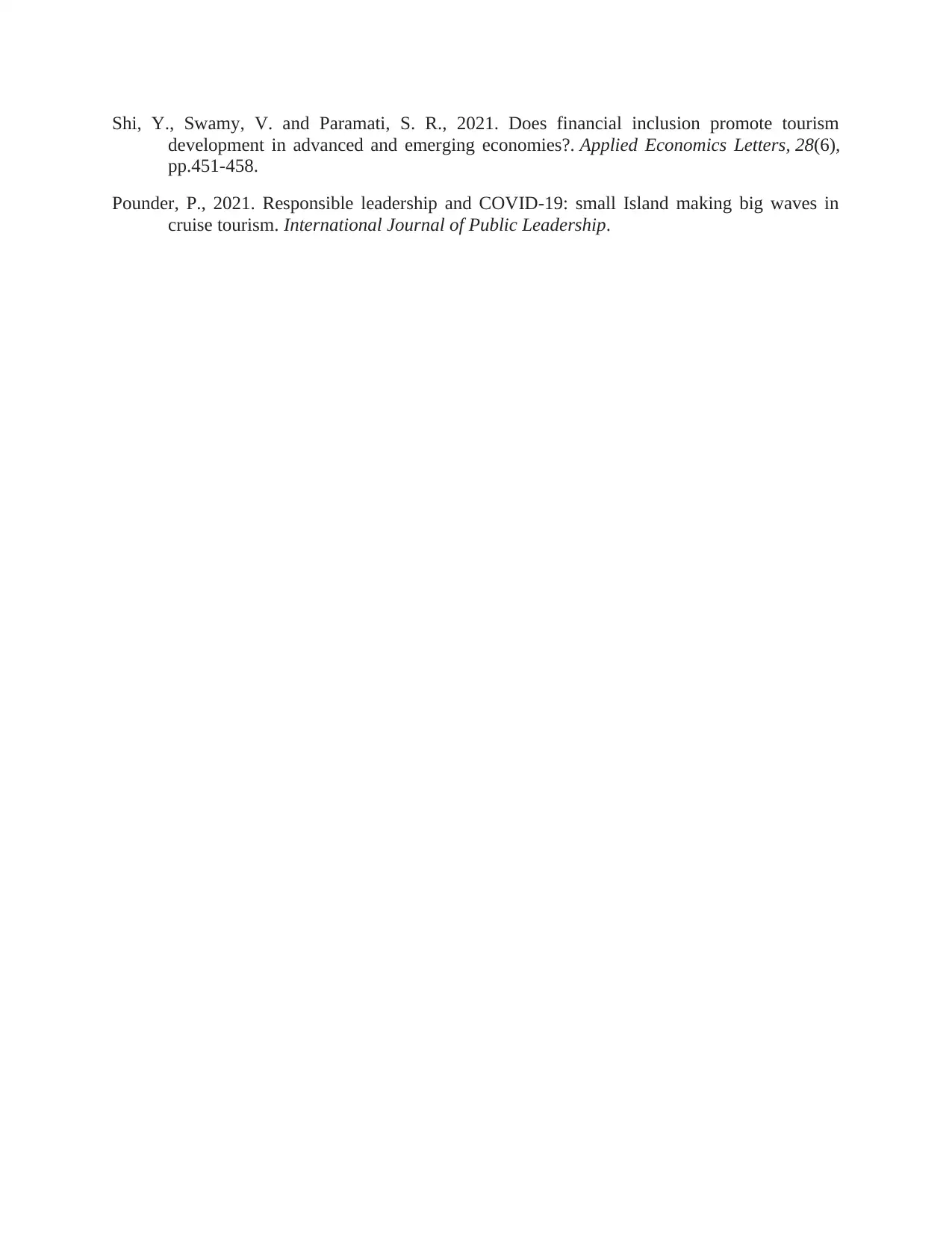
Shi, Y., Swamy, V. and Paramati, S. R., 2021. Does financial inclusion promote tourism
development in advanced and emerging economies?. Applied Economics Letters, 28(6),
pp.451-458.
Pounder, P., 2021. Responsible leadership and COVID-19: small Island making big waves in
cruise tourism. International Journal of Public Leadership.
development in advanced and emerging economies?. Applied Economics Letters, 28(6),
pp.451-458.
Pounder, P., 2021. Responsible leadership and COVID-19: small Island making big waves in
cruise tourism. International Journal of Public Leadership.
1 out of 10
Related Documents
Your All-in-One AI-Powered Toolkit for Academic Success.
+13062052269
info@desklib.com
Available 24*7 on WhatsApp / Email
![[object Object]](/_next/static/media/star-bottom.7253800d.svg)
Unlock your academic potential
Copyright © 2020–2026 A2Z Services. All Rights Reserved. Developed and managed by ZUCOL.

